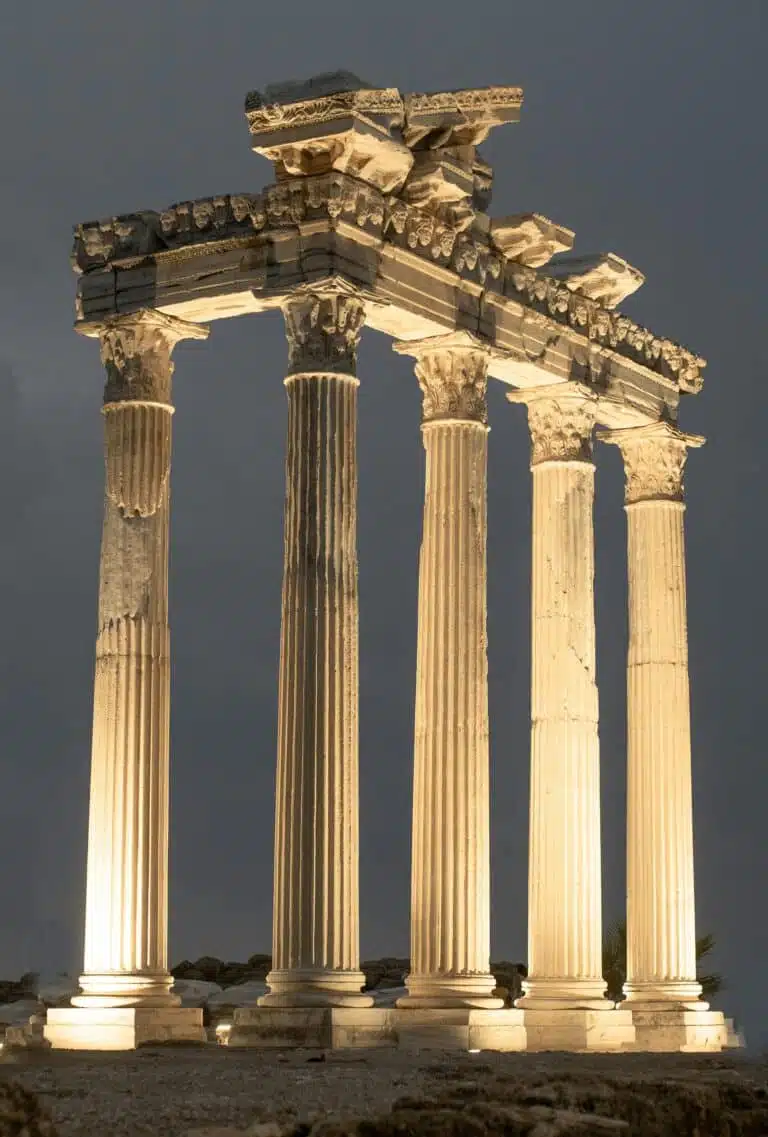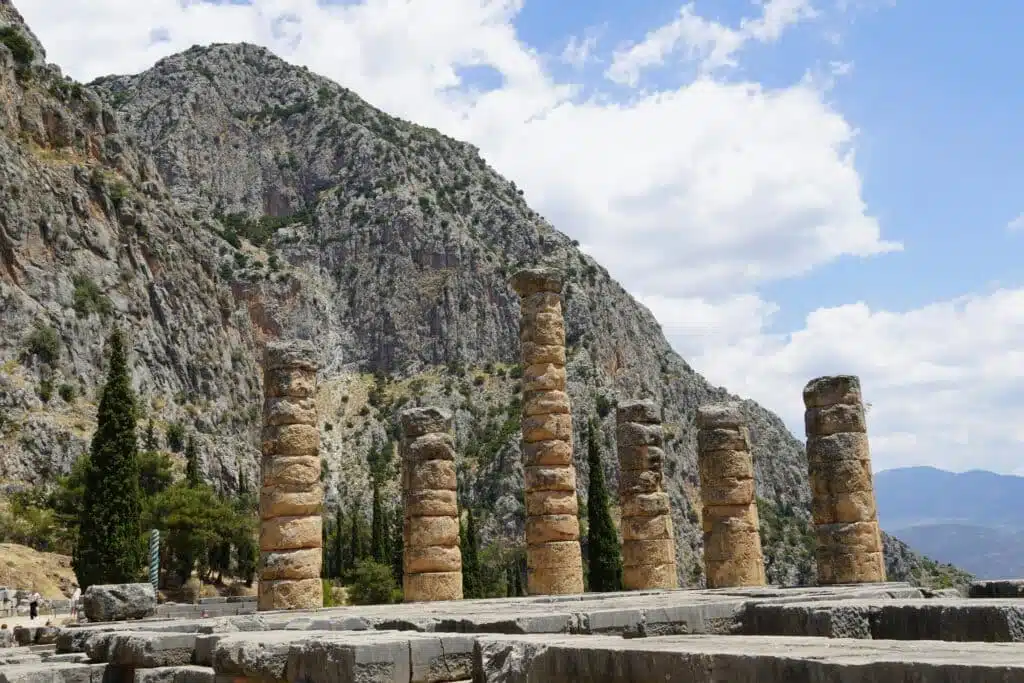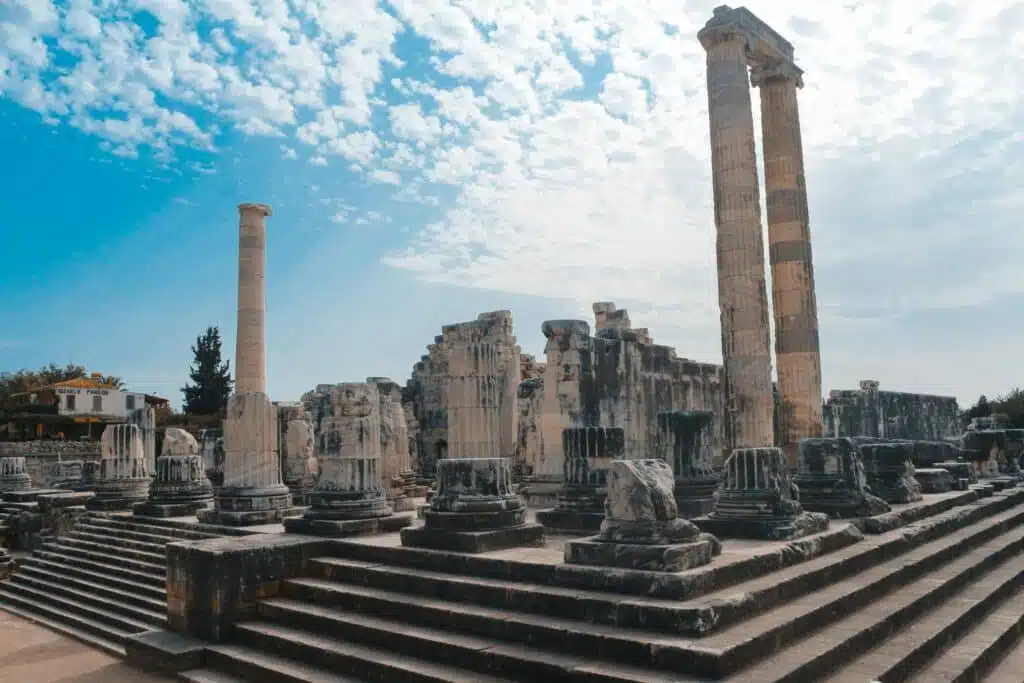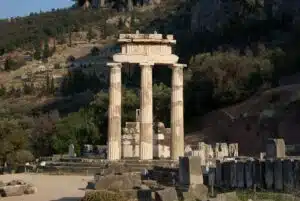
Technical analysis of Stalia olive oil
Discover a complete, technical, rigorous and visual study of the technical analysis of Stalia olive oil.

Perched on the slopes of Mount Parnassus, the Temple of Apollo at Delphi embodies an era when spirituality, prophecy and art came together. The site was much more than just a place of worship; it was considered the center of the world by the ancient Greeks. The omphalos, a sacred stone, symbolized the navel of the Earth. According to mythology, two eagles, sent by Zeus, met here, reinforcing Delphi’s sacredness.
This sanctuary attracted kings and citizens eager to consult the oracle and obtain divine advice. Located at the heart of the site, it bore witness to this importance. The rites and celebrations that took place here contributed to Delphi’s renown. Today, Delphi remains a must-see destination for those interested in the history and culture of ancient Greece. Each visit immerses visitors in a rich past, allowing them to feel the spiritual energy that has long emanated from this sacred site.
Delphi, with its unique heritage and atmosphere, remains a strong symbol of Greek identity and continues to inspire visitors from all over the world.
The Temple of Apollo at Delphi occupies a central place in Greek mythology. Apollo, god of light and music, dominated this sacred sanctuary. Here, the Pythia transmitted prophecies to pilgrims. This connection between the divine and mortals influenced Greek politics and society. Major decisions, such as wars and alliances, depended on the predictions of the oracle.
For the ancient Greeks, the temple represented direct access to divine wisdom. The legend of Apollo and his battle with the serpent Python underlines its protective role. This victory symbolized Apollo’s power, reinforcing the sacredness of the site.
Temples like that of Apollo brought the community together. Citizens came to consult the oracle and take part in festivals. This interaction between religion and society reinforces the cultural importance of the temple in antiquity. The Temple of Apollo at Delphi thus remains a reference point for those interested in the historical and spiritual wealth of Greece.
In short, the temple is a living symbol of Greek culture. Whether you’re a history buff or simply curious, Delphi and its temple offer you an unforgettable experience, rich in learning and discovery.
The Temple of Apollo at Delphi, rebuilt in the 4th century BC, bears witness to the architectural ingenuity of the Greeks. The first version, built in the 6th century BC, was destroyed by an earthquake in 373 BC. Today, although partially in ruins, it retains elements of the Doric style characteristic of classical Greek architecture.
The naos, or main building, was surrounded by 38 Doric columns supporting the entablature. Inside, the gold-and-ivory statue of Apollo stood, while the Pythia delivered her prophecies. The temple also housed the omphalos, the sacred stone marking the center of the world.
Its strategic location, overlooking the Pleistos plains, offers impressive panoramic views. This harmony between architecture and landscape accentuates the transcendence of the site. The temple’s elegant proportions and meticulous detailing make it a masterpiece that has fascinated visitors from all over the Mediterranean.
The Pythia was an emblematic figure of Delphi, serving as intermediary between Apollo and mortals. Seated on a throne in the temple, she would enter a trance, influenced by vapors rising from the ground. Influential figures from all over Greece came to consult her for her prophecies. The oracle answered questions about battles, marriages and other crucial decisions. Her answers, often ambiguous, required interpretation. A famous example is her prophecy before the Battle of Salamis, which guided the Athenians in their strategy. Pythia’s power endured, even attracting the attention of the Roman emperor Augustus.

The Pythian Games, held in Delphi in honor of Apollo, are considered the second most important games after the Olympic Games. Held every four years, these celebrations combined athletic competitions, artistic contests and religious ceremonies. Athletes took part in events such as running, pugilism and throwing, while musical and poetic talents were also rewarded. Winners received a laurel wreath, the sacred symbol of Apollo, immortalizing their names in Greek history. These games reinforced Delphi’s role as a cultural and religious center, unifying Hellenic civilization.

Delphi has a fascinating history spanning many centuries. Founded in the 8th century BC, the city became a major religious and political center. During the Classical period, it attracted pilgrims from all over Greece. Even Alexander the Great consulted the oracle before embarking on his campaign against the Persian Empire.
However, as Roman power grew, Delphi lost its influence. Emperor Hadrian, an admirer of Greek culture, visited the sanctuary in the 2nd century A.D. He had several monuments restored, but Delphi’s spiritual importance had already begun to wane.
Finally, under Emperor Theodosius I, the sanctuary closed as part of the Christianization of the Roman Empire. Despite this decline, Delphi remains a precious vestige of Greek antiquity.
Today, Delphi is an essential site for archaeology and mythology enthusiasts. Listed as a UNESCO World Heritage Site since 1987, the sanctuary continues to fascinate visitors with its majestic ruins. Although the Temple of Apollo is only a vestige of its former glory, it remains one of the most impressive monuments of ancient architecture.
Visitors can explore other major buildings on the site. For example, the Athenian Treasury, a small temple, housed offerings from the Greek city-states. And the Theater of Delphi offered dramatic performances against a backdrop of breathtaking scenery.
Not far from the temple, the well-preserved Delphi Stadium is a reminder of the importance of the Pythian Games. A venue for sporting and cultural competitions, it bears witness to the enduring legacy of Greek culture.
Despite the many archaeological discoveries at Delphi, certain enigmas remain. One of the biggest questions concerns the fumes that are said to have helped Pythia enter a trance. For centuries, historians and scientists have debated the origin of these fumes. Recent studies show that the geology of Delphi, with its tectonic faults, could be releasing natural gases such as ethane and methane.
This discovery reopens the debate on Pythia’s trances and their impact on the psychology of the priestess. It also opens up a new perspective on ancient religious practices. Delphi continues to captivate researchers and history buffs alike.
A visit to Delphi is a unique experience that combines history and natural beauty. Located around 180 km northwest of Athens, the site is easily accessible by car or bus. Numerous organized tours offer guided tours to discover the emblematic sites.
The sanctuary is open all year round. However, it is advisable to visit early in the morning or late in the day to avoid the crowds. In addition to the sanctuary ruins, don’t miss the Delphi Archaeological Museum. This must-see site features precious artifacts, including the omphalos and the famous statue of the Delphic Coachman, a masterpiece of Greek sculpture.
Get ready to plunge into an ancient world, where every stone tells a fascinating story. Don’t forget to take your time to appreciate every detail and enjoy the magic of Delphi.
Delphi, with its majestic temple dedicated to Apollo, is more than just an archaeological site. This unique place embodies the meeting point of myth, religion and politics. It shaped not only Greek civilization, but also the history of the Western world.
Walking through the ruins of Delphi, you’ll step back in time to discover an era when gods and men shared a strong bond. The oracle was consulted for every crucial decision. Today, the site remains a source of inspiration and fascination. Every year, thousands of visitors come to explore the mystery and magic of this sacred site.
The Acropolis of Athens | | News | Products Greece | Greek Recipes | Our Producers and Artisans | Temple of Zeus | Boutique | The Odeon of Herod Atticus | Tarama | Skiathos | Kefalonia | Hydra | Milos | Temple of Apollo | Paros | Olive oil | Lesvos | Growy and Tasty | Keftedes | Greek yogurt | Athens Marathon | Patras Carnival | The Parthenon |
Recent articles

Discover a complete, technical, rigorous and visual study of the technical analysis of Stalia olive oil.

Discover a complete, technical, rigorous and visual study of the technical analysis of Eladaki olive oil.

The Festival of Athens and Epidaurus 2025, to be held from June 1 to August 24, celebrates 70 years of cultural history. This not-to-be-missed event combines ancient theater, classical music, opera, contemporary dance and innovative creations, spread between the Odeon of Herod Atticus in Athens, the ancient theater of Epidaurus, Peiraios 260 and other exceptional sites. With a rich, international program, advanced accessibility features, and an organization that cares about heritage and the environment, the festival offers a unique experience combining heritage, art and modernity.

Discover Delphi, the spiritual center of ancient Greece. Oracle, architecture, myths, sacred geography: immerse yourself in the history of a unique UNESCO-listed site, where legend, power and living heritage come together.
Disappeared over two thousand years ago, the Colossus of Rhodes continues to fascinate. Ranked among the Seven Wonders of Antiquity, this bronze giant dedicated to Helios symbolized power, resilience and Rhodian identity. Through ancient stories, works of art and modern projects, its myth endures. This article explores the history, construction and legacy of one of the most emblematic figures of the ancient world.
100% Greek products from local artisans, shipped from Rethymno in Crete!
Transactions protected by the latest European standards.
Any questions? We respond quickly and attentively.
We deliver worldwide with DHL tracked delivery.
 Accessories
Accessories
 Beverages
Beverages
 Cosmetics
Cosmetics
 Gift sets and kits
Gift sets and kits
 Grocery
Grocery
 Home and decoration
Home and decoration
 Non classifié(e)
Non classifié(e)